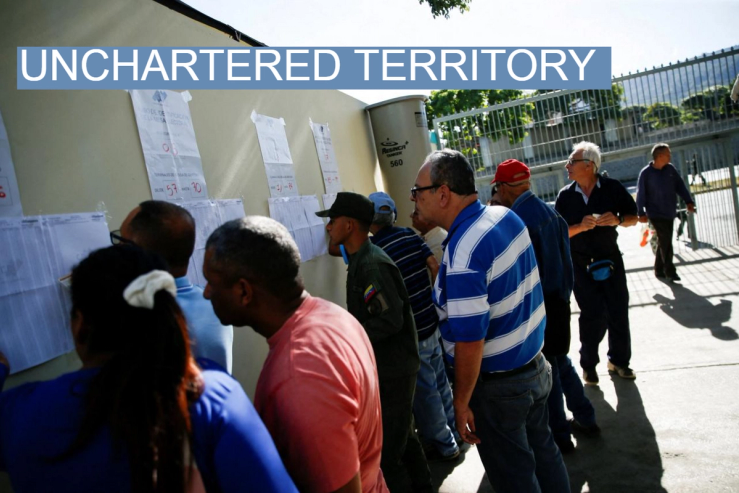The News
Venezuela fueled tensions with Guyana after a referendum approved a measure that backs Caracas claims over disputed territory.
Some 95% of voters voted in favor of annexing the Essequibo region— currently part of Guyana, though long disputed between the two countries — and turning it into a new Venezuelan state. Experts have, however, repeatedly warned about the credibility of elections in Venezuela, particularly under the authoritarian regime of President Nicolás Maduro.
The development comes days just after the U.N ’s top court warned Caracas not to take any action that would alter Guyana’s sovereignty over the territory. Venezuela insists the oil-rich region has always been part of the country and is only part of Guyana because of British colonialism. It remains unclear if Venezuela will actually follow through with the results of the referendum.
SIGNALS
Maduro’s threat is likely more of a political ploy meant to fan the flames of nationalism and boost his faltering popularity, Venezuela watchers told the Miami Herald. “Maduro would be crazy” to actually try and seize the territory, given the “number of negatives of annexation,” one expert said. Invading Guyana would risk further isolating money-depleted Venezuela from the global economy, risking more sanctions on Caracas, and creating “more international problems than the ones [Maduro] already has,” another think tank researcher told the Herald.
Brazil has a crucial role to play in mediating the conflict, an O Globo editorial argued. The country borders both Venezuela and Guyana, so Brazilian President Luis Inacio “Lula” Da Silva must “exercise Brazilian leadership” and convince Maduro to stand down, O Globo argued. The outlet invoked memories of Argentina’s “terrible experience” in the Falklands War when a militarily and economically weak regime invaded the islands, resulting in the deaths of hundreds of young Argentines and no ultimate territorial gain from Britain, which controls the Falklands. “The lessons taught by the recent past should serve as a warning to Maduro about the risk of nationalist outbursts,” O Globo argued.
Venezuela’s opposition has no clear plan against the aggression, Venezuelan journalist Luz Mely Reyes noted in El País. The opposition’s leader María Corina Machado blasted the referendum as “useless,” but she has yet not presented a clear plan about how to avoid a geopolitical catastrophe. Coupled with Machado’s recent disqualification from upcoming presidential elections, Maduro has no real counterbalance, Reyes wrote. Venezuela’s opposition must instead settle inter-party disputes that have undermined any real challenge to Maduro, and work on bringing in groups like trade unions — many of whom are wary of annexation because of the economic impacts — to rally alongside them.
Beijing has major business stakes in Guyana, but an invasion of the region would not necessarily complicate its relations with China, Essequibo expert Ricardo Salvador De Toma-García told Semafor. While Maduro has repeatedly warned about the influence of ExxonMobil in Essequibo, he has not mentioned the dozens of concessions Guyana has given to Chinese companies “for the exploitation of wood, gold, and bauxite” in the region. Still, China is a “very pragmatic” country that has entered Essequibo specifically to counter U.S. influence, Salvador De Toma said. Maduro would need to assure China that its commercial interests in Essequibo were protected because Venezuela owes China a “gigantic debt” after years of investment in the country, he added.



